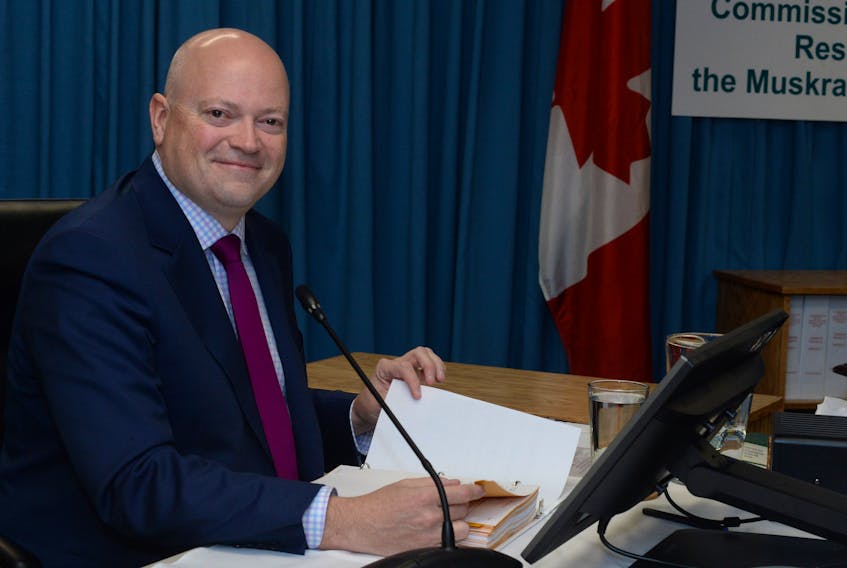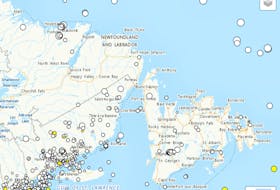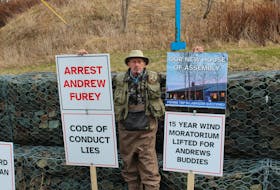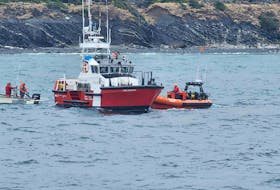Not all of the information considered by Nalcor Energy in 2010-12, in deciding against natural gas for domestic power, was made public at the time.
Testifying at the Muskrat Falls Inquiry Thursday, Nalcor Oil and Gas lead Jim Keating mentioned public and private (oil company) reports, and oil company positions, saying bringing offshore gas to Newfoundland by pipeline was not considered a reasonable alternative to a new hydroelectric development.
Capital cost aside, Keating testified about conversations with companies including Husky Energy, with its gas-rich White Rose field offshore Newfoundland, about purchases. He said the companies had all looked at options for landing gas, knew what was involved, and were not interested.
“I take it your position is: unless Husky expressed an interest in this, it was a dead issue?” inquiry co-counsel Barry Learmonth asked Keating.
“Absolutely,” he answered.
Learmonth asked about the wisdom of letting an oil company’s position be the end of the matter.
“There would be precious few alternatives to employ if the gas resource owner had no interest to develop an offshore project,” Keating said.
He testified he did not believe a company could be forced to produce natural gas and land it on the island.
Learmonth asked why Nalcor Energy didn’t try to negotiate with Husky. He referred to former premier Danny Williams and to negotiations before the signing of the agreements for the Hebron offshore oil project, led by ExxonMobil Canada, partnered with Chevron Canada (with a 29.6 per cent stake, Suncor Energy with 21 per cent, Equinor with 9 per cent and Nalcor Energy with 4.9 per cent).
He said the Hebron negotiations were different because there were willing parties. Companies were interested to begin with. In the case of a pipeline for natural gas to the island, that just wasn’t the case, he said.
He also said trying to force any operator into an immediate development would have had a “chilling effect” on investments in Newfoundland and Labrador.
As for what a pipeline might cost, he agreed Nalcor Energy didn’t commission a feasibility study. “Because we had understood — and the condition still exists to this day — that a small-bore pipeline to feed the domestic market was either uneconomic or less optimal than a host of other natural gas opportunities,” he said, referring to his memory of an examination by Husky Energy in 2003-04.
He said there was no change in inputs in the interim to spur Nalcor Energy to review the idea.
But Nalcor Energy did investigate the alternative possibility of importing gas from the international marketplace.
A report not previously made public was entered into evidence. “Newfoundland LNG Import Advisory” was produced by PIRA Energy for Nalcor Energy and dated Sept. 7, 2012. It priced imports, noting potentially higher than expected shipping costs given the ice-class vessel required, that forecasted “fair” gas prices could run higher for the province at the decision of the seller, and remarked on the province’s energy mix and significance of the gas proposal in feeding base energy demand.
“(Newfoundland and Labrador’s) projected degree of dependence on one single fossil fuel, LNG, for thermal power generation is almost exclusive,” it stated.
Keating’s time on the stand followed testimony on Oct. 5 and Nov. 5 from Memorial University of Newfoundland professor and engineer Stephen Bruneau, who spoke about the available information on natural gas, and that it was not fully explored.
Keating testified that he respected Bruneau, but believed their understanding on pipeline potential was simply shaped by different information.
Related stories:
Natural gas not considered, says engineer (Stephen Bruneau’s testimony, part one)









